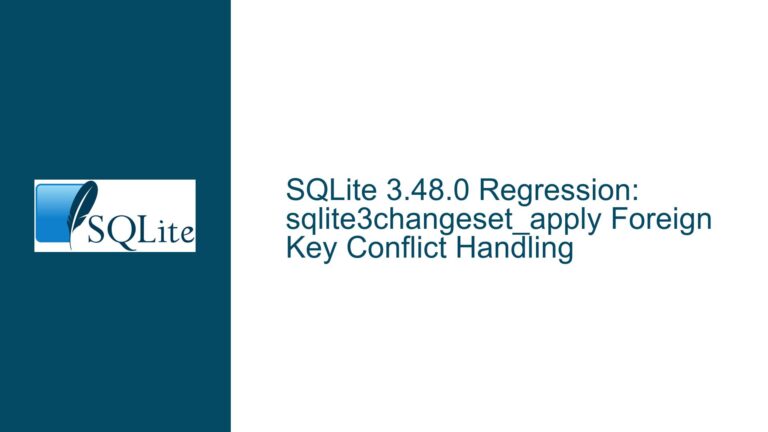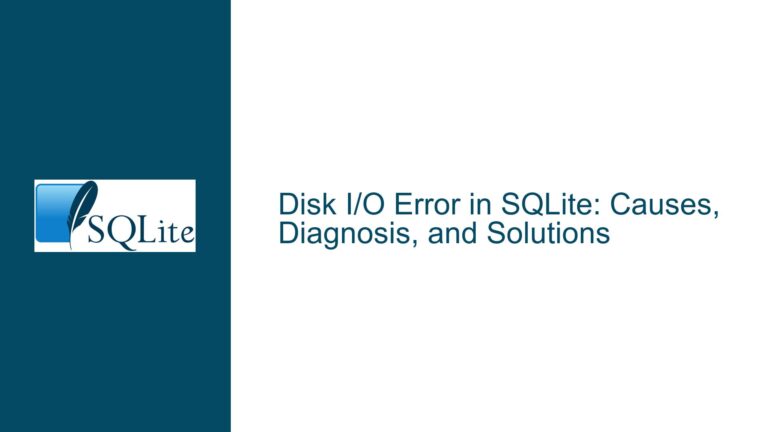SQLite sqldiff Output File Parameter and Index Diff Issues
Issue Overview: sqldiff Output File Parameter and Index Diff Problems
The core issue revolves around the sqldiff utility in SQLite, which is used to generate SQL scripts that represent the differences between two databases. The discussion highlights two primary concerns: the lack of a direct output file parameter in sqldiff and the incorrect handling of index differences when generating the SQL diff script.
The first problem is the absence of an output file parameter in sqldiff. Currently, users must rely on shell redirection (e.g., > sqldiff.sql) to save the diff output to a file. While this works in many cases, it introduces potential issues with formatting, especially when dealing with line endings (CR, CRLF) and empty lines. This can lead to inconsistencies in the generated SQL script, particularly when the script is executed and then re-diffed.
The second problem is related to how sqldiff handles index differences. When an index difference is detected, sqldiff generates a SQL script that includes a DROP INDEX statement followed by a CREATE INDEX statement. However, the generated script may contain unnecessary empty lines and incorrect line endings, which can cause the script to fail or produce unexpected results when executed. Specifically, the script may drop and recreate the same index even when no changes are needed, leading to redundant operations and potential performance issues.
These issues are particularly problematic in environments where automated database migrations or synchronization processes rely on sqldiff to generate accurate and efficient SQL scripts. The presence of unnecessary DROP INDEX and CREATE INDEX statements, along with formatting inconsistencies, can disrupt these processes and introduce errors.
Possible Causes: Redirection Issues and Index Diff Logic
The root cause of the output file parameter issue lies in the design of the sqldiff utility itself. sqldiff was not originally designed to write directly to a file; instead, it outputs the SQL script to standard output (stdout). Users are expected to redirect this output to a file using shell commands. While this approach is functional, it does not provide fine-grained control over the output format, leading to potential issues with line endings and empty lines.
The problem with index differences stems from the logic used by sqldiff to generate the SQL script. When sqldiff detects a difference in indexes between the source and target databases, it generates a DROP INDEX statement followed by a CREATE INDEX statement. This approach is intended to ensure that the index is recreated with the correct definition. However, the utility does not account for cases where the index definition has not actually changed. As a result, it generates redundant DROP INDEX and CREATE INDEX statements, which can lead to unnecessary operations and potential errors.
Additionally, the formatting issues in the generated SQL script are likely due to the way sqldiff handles line endings and empty lines. The utility may not consistently use the correct line endings (CR, CRLF) for the target platform, leading to inconsistencies in the output. These inconsistencies can cause problems when the script is executed, particularly in environments where strict formatting is required.
Troubleshooting Steps, Solutions & Fixes: Implementing Output File Parameter and Correcting Index Diff Logic
To address the output file parameter issue, the sqldiff utility can be modified to include a new command-line option that allows users to specify an output file directly. This would eliminate the need for shell redirection and provide better control over the output format. The proposed code changes include adding a writeToFile flag and modifying the printf statements to use fprintf when writing to the output file. This ensures that the SQL script is written directly to the specified file with the correct formatting.
The following code changes demonstrate how to implement the output file parameter:
int main(int argc, char **argv){
int writeToFile = 0;
const char *zDb1 = 0;
//-------------------------------------
if (strcmp(z, "outputfile") == 0) {
if (i == argc - 1) cmdlineError("missing argument to %s", argv[i]);
out = fopen(argv[++i], "wb");
writeToFile = 1;
if (out == 0) cmdlineError("cannot open: %s", argv[i]);
} else if (strcmp(z, "changeset") == 0) {
// Existing logic for changeset
}
//-------------------------------------
if (useTransaction) fprintf(out, "COMMIT;\n");
if (writeToFile) {
fclose(out);
}
}
This modification allows users to specify an output file using the --outputfile parameter, ensuring that the SQL script is written directly to the file with the correct formatting.
To address the index diff issue, the sqldiff utility should be updated to include logic that checks whether the index definition has actually changed before generating DROP INDEX and CREATE INDEX statements. This can be achieved by comparing the index definitions in the source and target databases and only generating the necessary statements when a difference is detected.
The following pseudocode demonstrates how to implement this logic:
if (indexDefinitionChanged(srcIndex, targetIndex)) {
fprintf(out, "DROP INDEX %s;\n", srcIndex.name);
fprintf(out, "CREATE INDEX %s ON %s (%s);\n", srcIndex.name, srcIndex.table, srcIndex.columns);
}
This approach ensures that DROP INDEX and CREATE INDEX statements are only generated when the index definition has actually changed, eliminating redundant operations and improving the efficiency of the generated SQL script.
Additionally, the sqldiff utility should be updated to handle line endings and empty lines consistently. This can be achieved by using platform-specific line endings (CRLF for Windows, LF for Unix-like systems) and ensuring that empty lines are not inserted unnecessarily. The following code demonstrates how to handle line endings consistently:
#ifdef _WIN32
#define LINE_ENDING "\r\n"
#else
#define LINE_ENDING "\n"
#endif
fprintf(out, "BEGIN TRANSACTION;" LINE_ENDING);
fprintf(out, "CREATE INDEX \"col1_binary\"" LINE_ENDING);
fprintf(out, "ON \"test\" (" LINE_ENDING);
fprintf(out, " \"col2\" COLLATE BINARY ASC" LINE_ENDING);
fprintf(out, ");" LINE_ENDING);
fprintf(out, "COMMIT;" LINE_ENDING);
By implementing these changes, the sqldiff utility can generate SQL scripts that are more accurate, efficient, and consistent, addressing the issues highlighted in the discussion.
In conclusion, the issues with the sqldiff utility can be resolved by adding an output file parameter, improving the logic for handling index differences, and ensuring consistent formatting in the generated SQL script. These changes will enhance the utility’s functionality and make it more reliable for use in automated database migration and synchronization processes.






